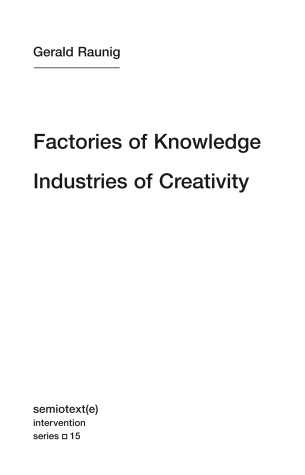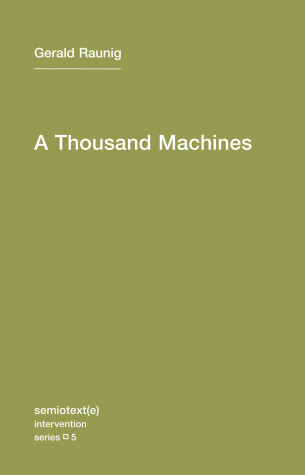Semiotext(e) / Intervention
1 primary work • 2 total works
Book 15
What was once the factory is now the university. As deindustrialization spreads and the working class is decentralized, new means of social resistance and political activism need to be sought in what may be the last places where they are possible: the university and the art world. Gerald Raunig's new book analyzes the potential that cognitive and creative labor has in these two arenas to resist the new regimes of domination imposed by cognitive capitalism. Drawing on Gilles Deleuze's concept of “modulation” as the market-driven imperative for the constant transformation and reinvention of subjectivity, in Factories of Knowledge, Industries of Creativity, Raunig charts alternative horizons for resistance.
Looking at recent social struggles including the university strikes in Europe, the Spanish ¡Democracia real YA! organization, the Arab revolts, and the Occupy movement, Raunig argues for a reassessment of the importance of cultural and knowledge production. The central role of the university, he asserts, is not as a factory of knowledge but as a place of creative disobedience.
The machine as a social movement of today's "precariat"-those whose labor and lives are precarious.
In this "concise philosophy of the machine," Gerald Raunig provides a historical and critical backdrop to a concept proposed forty years ago by the French philosophers Felix Guattari and Gilles Deleuze: the machine, not as a technical device and apparatus, but as a social composition and concatenation. This conception of the machine as an arrangement of technical, bodily, intellectual, and social components subverts the opposition between man and machine, organism and mechanism, individual and community.
Drawing from an unusual range of films, literature, and performance-from the role of bicycles in Flann O'Brien's fiction to Vittorio de Sica's Neorealist film The Bicycle Thieves, and from Karl Marx's "Fragment on Machines" to the deus ex machina of Greek drama-Raunig arrives at an enhanced conception of the machine as a social movement, finding its most apt and concrete manifestation in the Euromayday movement, which since 2001 has become a transnational activist and discursive practice focused upon the precarious nature of labor and lives.

